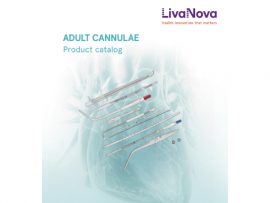Abstract Background Cardiac surgery-associated acute kidney injury (CSA-AKI) is one of the most frequent and severe complications after cardiac surgery. The association between acute kidney injury and the mismatch between..
Read MoreAbstract Objectives Early prediction is crucial for cardiac surgery-associated acute kidney injury (CSA-AKI). We aimed to develop and validate a simple, clinical- and laboratory-based risk score system for better CSA-AKI..
Read MoreAbstract Cardiac procedures carry a higher perioperative risk than other operations for major adverse cardiovascular events and kidney injury, especially since patients with multiple comorbidities have been accepted as candidates..
Read MoreAbstract Purpose: Dexmedetomidine, an alpha-2 adrenergic agonist, has shown potential benefits in various surgical settings, but its impact on microcirculation and renal function in cardiac surgery patients remains unclear. Patients and..
Read MoreAbstract Objectives Oxygen delivery (DO2) is a pivotal factor in maintaining adequate tissue protection during cardiopulmonary bypass (CPB). Despite its clinical significance, there is currently no global consensus regarding standardized..
Read MoreAbstract Objective To determine the relationship between intraoperative decreased renal and cerebral oxygen saturation, as measured using near-infrared spectroscopy (NIRS), and cardiac surgery-associated acute kidney injury (CSA-AKI) in adults. Methods..
Read MoreAbstract Objectives: The difference between mean arterial pressure (MAP) before cardiopulmonary bypass (CPB) and mean perfusion pressure (MPP) during CPB is thought to be a strong predictor of acute kidney injury..
Read MoreAbstract Objectives Acute kidney injury (AKI) is a common and serious complication of cardiac surgery, often linked to the use and duration of cardiopulmonary bypass (CPB). The Hemolysis Index (HI)..
Read MoreAbstract Background Extracorporeal membrane oxygenation (ECMO) is a life-saving treatment, but carries a high risk of complications such as acute kidney injury (AKI). A contributor to AKI is hemolysis, which..
Read MoreAbstract Objectives Cardiac surgery-associated acute kidney injury (CSA-AKI) is a frequent and important complication often attributed to decreased kidney blood flow. Ultrasound measurement of renal has been associated with adverse cardiac..
Read MoreAbstract Cardiac surgery-associated acute kidney injury (CSA-AKI) is a common complication following cardiac surgery. Despite growing awareness of sexual dimorphism in cardiovascular and chronic kidney disease, little is known about..
Read MoreAbstract Background Cardiac surgery-associated acute kidney injury (CSA-AKI) is a notably common complication in pediatrics, with an incidence rate ranging from 15 to 64%. This rate is significantly higher than..
Read MoreBlood transfusion and acute kidney injury after cardiac surgery: a retrospective observational study
Abstract Purpose Cardiac surgery-associated acute kidney injury (AKI) is linked to poor outcomes. An observational study from Copenhagen, Denmark identified perioperative red blood cell (RBC) transfusion as a modifiable risk..
Read MoreAbstract Background Hyperlactatemia and acute kidney injury (AKI) represent significant perioperative complications in cardiac surgery. This study investigated their relationship by analyzing multiple lactate parameters during on-pump cardiac procedures. Methods..
Read MoreAbstract The emergence of large language models (LLMs) opens new horizons to leverage, often unused, information in clinical text. Our study aims to capitalise on this new potential. Specifically, we..
Read MoreAbstract Background Acute kidney injury (AKI) is a frequent and severe complication following cardiac surgery, particularly in patients with impaired kidney function. The existing Kidney Disease: Improving Global Outcomes (KDIGO)..
Read MoreAbstract Background: Cardiac surgery with cardiopulmonary bypass (CPB) is associated with impaired renal oxygenation and acute kidney injury. We investigated whether a higher than our standard blood flow during CPB..
Read MoreAbstract Background Acute kidney injury (AKI) and dysnatremia following pediatric cardiac surgery are common conditions associated with worse outcomes. While the multifactorial etiology of AKI is well-known, the role of..
Read MoreAbstract OBJECTIVES In cardiac surgery patients, acute kidney injury (AKI) frequently occurs in the setting of haemodynamic instability and treatment with temporary mechanical circulatory support (tMCS). Recent evidence suggests amino..
Read MoreAbstract OBJECTIVES Current preoperative counselling in neonatal cardiac surgery is mainly focused on the primary procedure. However, other factors must be considered when evaluating the surgical risk of a neonate...
Read MoreAbstract Importance Acute kidney injury (AKI) after cardiac surgery is a common and serious complication. Protein loading appears nephroprotective; thus, continuous hyperoncotic albumin infusion may impact AKI following high-risk cardiac surgery...
Read MoreAbstract Introduction Cardiac surgery in infants often triggers a severe inflammatory response. The role of biomarkers in predicting clinical outcomes in this group of patients has been debated in the..
Read MoreAbstract Acute kidney injury (AKI) is a frequent and severe problem following heart surgery, particularly in procedures involving cardiopulmonary bypass (CPB). This research investigates the Randomized Controlled Trial (RCT) on..
Read MoreAbstract Aims Pediatric cardiac arrest is associated with high mortality and significant morbidity among survivors. International guidelines for prognostication remain limited due to small heterogeneous patient populations, variable post-return of..
Read MoreAbstract Introduction Patient blood management (PBM), an evidence-based, patient-centred approach for optimising blood health, faces significant implementation challenges despite regulatory support, and this study explores its adoption within a Portuguese hospital..
Read MoreAbstract Background Acute kidney injury (AKI) usually occurs after cardiopulmonary bypass (CPB) and threatens life without timely intervention. Early assessment and prevention are critical for saving AKI patients. However, numerical..
Read MoreAbstract OBJECTIVES Peripheral cannula selection in minimally invasive cardiac surgery (MICS) is crucial, as venous drainage limitations during cardiopulmonary bypass (CPB) can impair end-organ perfusion and overall outcomes. This study..
Read MoreAbstract Vasoplegia syndrome is a specific form of vasodilatory shock encountered in patients who undergo cardiac surgery, most commonly with cardiopulmonary bypass, which is characterized by severe hypotension in the..
Read MoreAbstract We established a compact machine perfusion system for whole blood perfusion of rat liver by making use of oxygenation filters as an artificial lung. Livers removed from rats were..
Read MoreAbstract Background Acute kidney injury (AKI) is common in children with congenital heart disease following open-heart surgery with cardiopulmonary bypass (CPB). Early AKI detection in critically ill children requires clinician..
Read More


















